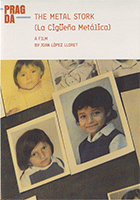
The Metal Stork (La Cigüeña Metálica) 2012
Distributed by Pragda, 302 Bedford Ave., #136, Brooklyn, NY 11249
Produced by Pragda and Framezero
Directed by Joan López Lloret
DVD , color, 80 min.
College - General Adult
War Crimes, Adoption, Children, Adolescents, Documentaries, Family Relations, Family, Military
Date Entered: 07/26/2017
Reviewed by Alan Witt, Business Librarian, SUNY GeneseoLa Cigüeña Metálica (The Metal Stork) is an intimate documentary relating the stories of several of the desaparecidos, children taken from their families by the military during the civil war in El Salvador during the 1980s. The narrative follows their personal stories from their initial childhood memories of kidnappings and adoptions into new families, to building their own families later in life. The film as a whole is both a synthesis of their experiences and a political chronicle aimed at the government that had perpetrated the kidnappings and then denied them. This focus stems in part from the fact that one of the co-writers for the film was involved in Pro-Búsqueda, an organization involved in connecting the desaparecidos with their past. The balance between the personal narratives and the overt political point lends the film much of its power.
Stylistically, La Cigüeña Metálica makes extensive use of visual and audial themes as transitional elements and leitmotifs, particularly the sound of helicopters. Each of the three subjects of the film has their own visual element, and these change slightly as the narrative progresses in order to underscore the points they are making. Coupled with a lack of musical background, these effects create an intimate connection between the viewer and the interviewees. In contrast to this, the few instances of background music underscore footage and photographs from the civil war. These highlight the impersonal and brutal nature of the kidnappings (particularly the footage of corpses), drawing a strong contrast between the past and the present. All of this powerfully weaves together the argument that the past (the civil war disappearances) has damaged the present (the desaparecidos) and must be confronted for the sake of the future (represented by the family footage of the children of the desaparecidos). The only evident flaw is occasional spelling errors in the subtitles, but this does not significantly detract from the intensity of the film.
The Metal Stork will be an asset for library collections focusing on a variety of issues. The use of themes has utility for film and literature criticism assignments, and the historical content is terrific as a starting point in investigating this part of El Salvador’s history. The language use, ranging as it does between adults and children, is an exceptional way to introduce students of Spanish to a range of live language usage. This video is highly recommended for libraries serving Spanish language or South American history programs.